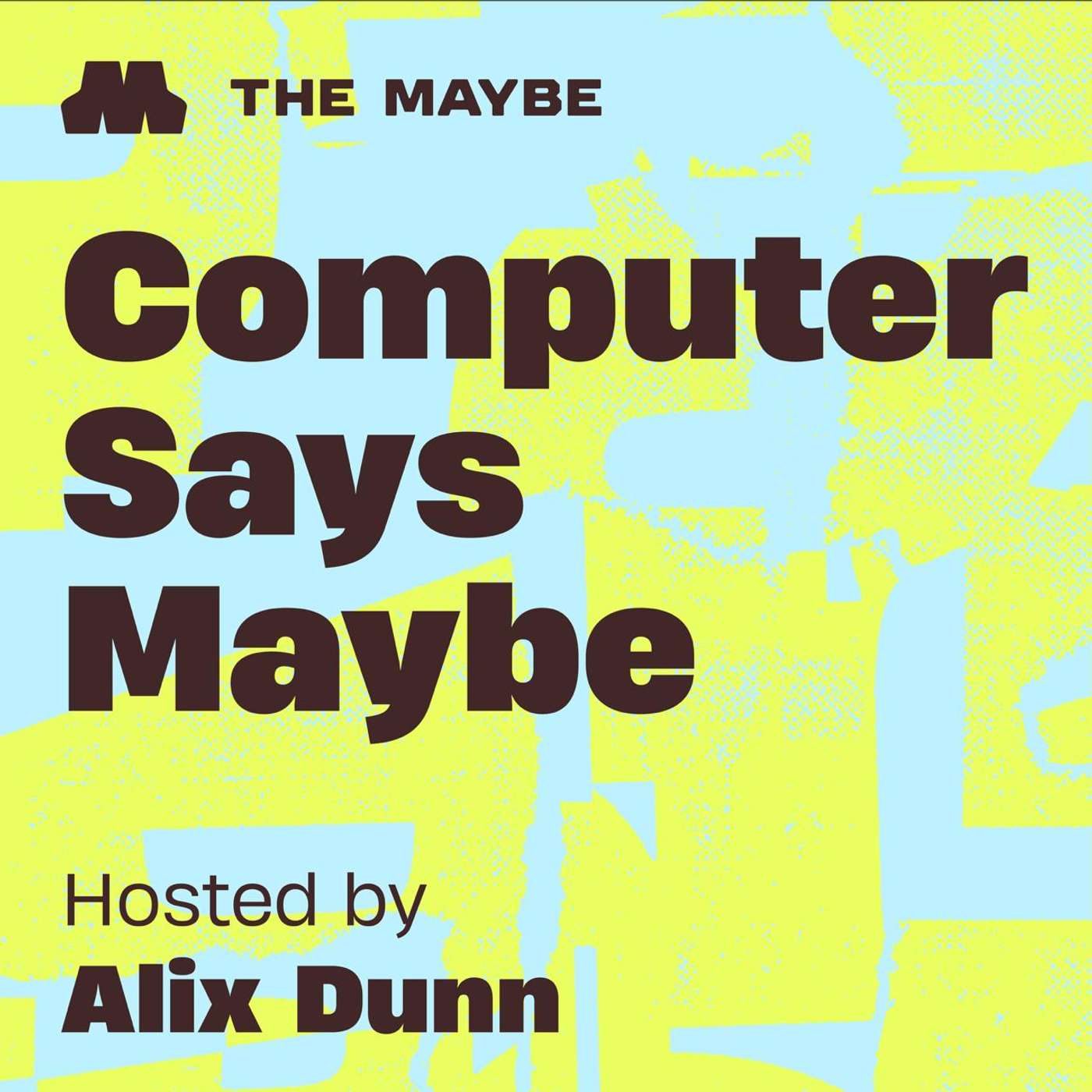

Computer Says Maybe
Alix Dunn
Technology is changing fast. And it's changing our world even faster. Host Alix Dunn interviews visionaries, researchers, and technologists working in the public interest to help you keep up. Step outside the hype and explore the possibilities, problems, and politics of technology. We publish weekly.
Episodes
Mentioned books

Sep 26, 2025 • 50min
Gotcha! How MLMs Ate the Economy w/ Bridget Read
Bridget Read, a features writer and author of *Little Bosses Everywhere*, dives into the dark world of multi-level marketing (MLM). She reveals how early door-to-door salesmen turned vitamins into recruitment-driven schemes, exploiting hopeful individuals. The conversation explores MLM's radical free-enterprise ideology and its ties to modern gig economies and crypto scams. Read connects personal experiences and the emotional toll of MLMs, arguing they symbolize deeper regulatory failures. Join the discussion on economic patterns and the cost of chasing entrepreneurial dreams.

Sep 19, 2025 • 56min
Gotcha! The Crypto Grift w/ Mark Hays
Hey you! Do you want some free internet money? If this sounds too good to be true, that’s because it is!More like this: Making Myths to Make Money w/ AI NowThis is Gotcha! A four-part series on scams, how they work, and how technology is supercharging them. We start with Mark Hays from Americans for Financial Reform (AFR), and get into one of the biggest tech-fuelled financial scams out there: cryptocurrencies.Like many things that require mass-buy in, crypto started with an ideology (libertarianism, people hating on Wall Street post 2008). But where does that leave us now? What has crypto morphed into since then, and how does it deceive both consumers and regulators into thinking it’s something that it’s not?Further reading & resources:Seeing Like a State by James C. ScottCapital Without Borders by Brooke HarringtonThe Politics of Bitcoin by David GolumbiaLearn more about Americans for Financial ReformCheck out Web3 Is Going Great by Molly WhiteLine Goes Up by Folding Ideas — an excellent survey of all the tactics and rug-pulls during the height of the NFT boomThe Missing Crypto Queen: a podcast by BBC Sounds, about a large scale crypto scam, where there wasn’t even any crypto**Subscribe to our newsletter to get more stuff than just a podcast — we run events and do other work that you will definitely be interested in!**

Sep 18, 2025 • 1min
Gotcha!
Gotcha! is a four-part series on scams, how they work, and how technology is supercharging them — running through to October 10.In the series we look at:Crypto: Mark Hays on how a thing touting financial freedom ended up being a kind of fin-cult, rife with scammingMulti-Level Marketing : Bridget Read on the history of the biggest and most successful type of scam that still plagues us todayGenerative AI: Data & Society’s primer on how generative AI is juicing the scam industrial complexEnshittification: Cory Doctorow on his upcoming book, and how the process of Enchittification represents user-hostile practices that scam people into paying more, and ecosystem lock-in

12 snips
Sep 12, 2025 • 43min
Nodestar: Turning Networks into Knowledge w/ Andrew Trask
Andrew Trask, Executive Director of the OpenMind Foundation, specializes in pioneering decentralized AI solutions. He envisions a world of 'broad listening,' where understanding emerges from abundant information without corporate gatekeeping. Addressing challenges like information overload and privacy, Andrew discusses creating open-source protocols that empower data owners and enhance transparency. He delves into the evolution of communication, emphasizing the need for secure, collaborative frameworks to navigate the complexities of truth in today's digital landscape.

Sep 5, 2025 • 42min
Nodestar: Building Blacksky w/ Rudy Fraser
Social media isn’t really social anymore. But that might be changing. Rudy Fraser over at Blacksky Algorithms has built something new. He has built the infrastructure to provide a safe online space for the black community, and in the process challenges the ideas of hierarchical, centralised networks. His work — even outside the very cool development of Blacksky — is an amazing, concrete example of how the abstract ambitions of decentralisation can provide real value for people, and sets us up for a new kind of tech politics.More like this: How to (actually) Keep Kids Safe Online w/ Kate SimThis is part two of Nodestar, our three-part series on decentralisation. Blacksky is a community built using the AT Protocol by Rudy Fraser. Rudy built this both out of a creative drive to make something new using protocol thinking, and out of frustration over a lack of safe community spaces for black folks where they could be themselves, and not have to experience anti-black racism or misogynoir as a price of entry.Rudy and Alix discuss curation as moderation, the future of community stewardship, freeing ourselves from centralised content decision-making, how technology might connect with mutual aid, and the beauty of what he refers to as ‘dotted-line communities’.Further reading:Blacksky AlgorithmsBlacksky the app — if you want an alternative to BlueskyMore about Rudy FraserOpen Collective — a fiscal host for communities and non-profitsPaper Tree — community food bankThe Implicit Feudalism of Online Communities by Nathan SchneiderFlashes — a 3rd party Bluesky app for viewing photosThe Tyranny of Struturelessness by JoreenRudy is a technologist, community organizer, and founder of Blacksky Algorithms, where he builds decentralized social media infrastructure that prioritizes community-driven safety, data ownership, and interoperability. As a Fellow at the Applied Social Media Lab at Harvard’s Berkman Klein Center for Internet & Society, he advances research and development on technology that empowers marginalized communities, particularly Black users

Aug 29, 2025 • 53min
Nodestar: The Eternal September w/ Mike Masnick
How did the internet become three companies in a trenchcoat? It wasn’t always that way! It used to be fun, and weird, and full of opportunity. To set the scene for the series, we spoke to a stalwart advocate of decentratilsation, Mike Masnick.More like this: Big Tech’s Bogus Vision for the Future w/ Paris MarxThis is part one of Nodestar, a three-part series on decentralisation: how the internet started as a wild west of decentralised exploration, got centralised into the hands of a small number of companies, and how the pendulum has begun it’s swing in the other direction.In this episode Mike Masnick gives us a history of the early internet — starting with what was called the Eternal September, when millions of AOL users flooded the scene, creating a messy, unpredictable, exciting ecosystem of open protocols and terrible UIs.Further reading & resources:Protocols, Not Platforms by Mike MasnickList of apps being built on AT ProtocolGraze — a service to help you make custom feed with ads on AT protoOtherwise Objectionable — an eight part podcast series on the history of section 230Techdirt podcastCTRL-ALT-SPEECH podast**Subscribe to our newsletter to get more stuff than just a podcast — we run events and do other work that you will definitely be interested in!**

Aug 22, 2025 • 14min
Short: UK Groups Sue To Block Data Center Expansion
Foxglove and Global Action Plan have just sued the UK government over their YOLO hyperscale data center plans.More like this: Net0++: Data Centre SprawlLocal government rejected the data center. But Starmer’s administration overruled them. They want to force the development of a water-guzzling, energy draining data center on a local community who has said no. And all of this is on the green belt. The lawsuit filed this week might put a stop to those plans.Alix sat down Ollie Hayes from Global Action Plan and Martha Dark from Foxglove to discuss the legal challenge filed this week. Why now? Aren’t the UK aiming for Net 0? And how does this relate to the UK government’s wider approach to AI?Further reading & resources:Read the Guardian article about the suitRead the Telegraph piece about the suitDonate to the campaignData Centre Finder on Global Action PlanComputer Says Maybe Shorts bring in experts to give their ten-minute take on recent news. If there’s ever a news story you think we should bring in expertise on for the show, please email pod@themaybe.org

Aug 22, 2025 • 41min
Big Tech’s Bogus Vision for the Future w/ Paris Marx
Independent journalist Paris Marx joins the discussion to dive into the often-overlooked impacts of hyperscale data centers and their relationship with generative AI. Marx critiques Silicon Valley's empty promises and the environmental costs of data center expansions. He highlights the gap left by inadequate U.S. industrial policy and the implications of outsourcing manufacturing to China. The conversation also touches on the need for public tech institutions and the rising power of tech founders, raising urgent questions about accountability and national tech sovereignty.

Aug 15, 2025 • 54min
Consciously Uncoupling from Silicon Valley w/ Cori Crider
How do we yank power out of tech oligarch hands without handing it over to someone else?More like this: Is Digitisation Killing Democracy? w/ Marietje SchaakeCori Crider is a fearless litigator turned market-shaping advocate. She started litigating during many years at leading human rights organisation Reprieve, and then moved on to co-founding Foxglove so she could sue big tech. Now she’s set her sights on market concentration.Cori’s analysis concludes with a hopeful message: we are not stuck in place with eight dudes running the show. In fact, we’ve been here before. The computer age never would have happened the way it did if thousands of patents weren’t liberated from Bell Labs in 1956. How can we use similar tactics to dethrone monopolies and think about how Europe and other large jurisdictions can decouple themselves from silicon valley infrastructure?Further reading & resources:Antitrust Policy for the Conservative by Mark Meader of the FTCThe Open Markets InstituteThe Future of Tech Institute**Subscribe to our newsletter to get more stuff than just a podcast — we run events and do other work that you will definitely be interested in!**Do you have an idea for the show? Email pod@themaybe.org

Jul 25, 2025 • 51min
After the FAccT: Labour and Misrepresentation
Did you miss FAccT? We interviewed some of our favourite session organisers!More like this: Part One of our FAccT roundup: Materiality and Militarisation.Georgia, Soizic, and Hanna from The Maybe team just went to FAccT. Georgia and Soizic interviewed a bunch of amazing researchers, practitioners, and artists to give you a taste of what the conference was like if you didn’t get to go. Alix missed it too — you’ll learn along with her!In part two we look into how AI is used to misrepresent people through things like image generation, and even care labour. These are conversations about AI misrepresenting hidden identities, care work becoming data work, how pride and identity is tied to labour — and how labour organisers are building solidarity and movement around this.Who features in this episode:Priya Goswami brought a multimedia exhibition to FAccT: Digital Bharat. This explores the invisibilised care work and manual labour by women in India, and how their day-to-day has become mediated by digital public infrastructures.Kimi Wenzel organised Invisible by Design? Generative AI and Mirrors of Misrepresentation, which invited users to confront generated images of themselves and discuss issues of representation within these systems.Alex Hanna and Clarissa Redwine ran the AI Workers Inquiry, which brought people together to share in how AI has transformed their work, identify common ground, and potentially begin building resistance.Further reading & resources:Circuit Breakers — tech worker conference organised by Clarissa RedwineKimi Wenzel’s researchBuy The AI Con by Alex Hanna and Emily Bender**Subscribe to our newsletter to get more stuff than just a podcast — we run events and do other work that you will definitely be interested in!**


